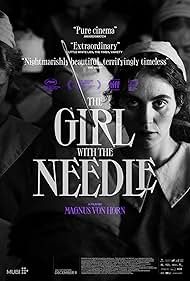Copenhagen 1919: A young worker finds herself unemployed and pregnant. She meets Dagmar, who runs an underground adoption agency. A strong bond grows stronger, but her world crumbles when she stumbles upon the shocking truth behind her actions. Denmark’s official submission for Best International Feature Film. in 2025 in the category of the 97th Academy Awards. It’s the last days of the Great War and Caroline is barely surviving by working in a factory. She thinks she’s a widow because her husband disappeared during the war (even though Denmark wasn’t actually involved), but she doesn’t get widow’s benefits because she wasn’t listed as dead. A lot happens during the movie. and I don’t want to go into spoilers, so I won’t go into the plot, except that the marketing highlights something that isn’t as important a part of the movie as one might expect. While this gets a lot of attention in the second half of the film, the real value of the film for me is the sense of reality surrounding Caroline’s story. When was the last time someone in a movie tried to convince a potential tenant to take an apartment by telling them they could have running water for two whole hours a day (from ten to noon, which might be too small a point since most people would be working during those hours)? When has rampant drug use been portrayed so honestly? Even what Dagmar does was pretty common in those days, although I’d guess the trend was on the decline at this point and it wasn’t like it used to be. I actually liked the movie. more so if the marketing was different and Dagmar wasn’t brought up because it created expectations. Although Dagmar is the main character, the film is clearly about Caroline and her difficulties. On the other hand, it’s hard to say how I would feel when I saw the name Dagmar Overby on the door if I didn’t know beforehand that this real-life person was used in the film. (It should be noted that the film is inspired by real-life events, not based on them, so they try to keep some distance from the real Dagmar). , because sometimes she seems to make the right decision a little too late. At the same time, there isn’t much time or opportunity for ethics when you’re just trying to survive in a world where the odds are stacked against you. On the other hand, even though we know that the hope that is given to her would be in vain in this world, we still understand why she gives in to it. I love the look of the film. It’s black and white, and the whole city looks abandoned and barely surviving. It reminds us of the lack of interest in, or even contempt for, the welfare of the working poor. Has everything really changed that much? The time represented took place more than a century ago, but the concept of the autonomy of the female body is again under constant attack. Of course, all art is in a sense a mirror of the time it was created, but it seems that it is easier to see the similarities. here.




 13/24
13/24